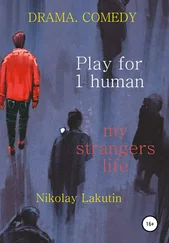Douglas Hofstadter - I Am a Strange Loop
Здесь есть возможность читать онлайн «Douglas Hofstadter - I Am a Strange Loop» весь текст электронной книги совершенно бесплатно (целиком полную версию без сокращений). В некоторых случаях можно слушать аудио, скачать через торрент в формате fb2 и присутствует краткое содержание. Жанр: Прочая документальная литература, на английском языке. Описание произведения, (предисловие) а так же отзывы посетителей доступны на портале библиотеки ЛибКат.
- Название:I Am a Strange Loop
- Автор:
- Жанр:
- Год:неизвестен
- ISBN:нет данных
- Рейтинг книги:4 / 5. Голосов: 1
-
Избранное:Добавить в избранное
- Отзывы:
-
Ваша оценка:
- 80
- 1
- 2
- 3
- 4
- 5
I Am a Strange Loop: краткое содержание, описание и аннотация
Предлагаем к чтению аннотацию, описание, краткое содержание или предисловие (зависит от того, что написал сам автор книги «I Am a Strange Loop»). Если вы не нашли необходимую информацию о книге — напишите в комментариях, мы постараемся отыскать её.
I Am a Strange Loop — читать онлайн бесплатно полную книгу (весь текст) целиком
Ниже представлен текст книги, разбитый по страницам. Система сохранения места последней прочитанной страницы, позволяет с удобством читать онлайн бесплатно книгу «I Am a Strange Loop», без необходимости каждый раз заново искать на чём Вы остановились. Поставьте закладку, и сможете в любой момент перейти на страницу, на которой закончили чтение.
Интервал:
Закладка:
In the interests of clarity, I have painted too simple a picture of the process of perception, for in reality, there is a great deal of two-way flow. Signals don’t propagate solely from the outside inwards, towards symbols; expectations from past experiences simultaneously give rise to signals propagating outwards from certain symbols. There takes place a kind of negotiation between inward-bound and outward-bound signals, and the result is the locking-in of a pathway connecting raw input to symbolic interpretation. This mixture of directions of flow in the brain makes perception a truly complex process. For the present purposes, though, it suffices to say that perception means that, thanks to a rapid two-way flurry of signal-passing, impinging torrents of input signals wind up triggering a small set of symbols, or in less biological words, activating a few concepts.
In summary, the missing ingredient in a video system, no matter how high its visual fidelity, is a repertoire of symbols that can be selectively triggered. Only if such a repertoire existed and were accessed could we say that the system was actually perceiving anything. Still, nothing prevents us from imagining augmenting a vanilla video system with additional circuitry of great sophistication that supports a cascade of signal-massaging processes that lead toward a repertoire of potentially triggerable symbols. Indeed, thinking about how one might tackle such an engineering challenge is a helpful way of simultaneously envisioning the process of perception in the brain of a living creature and its counterpart in the cognitive system of an artificial mind (or an alien creature, for that matter). However, quite obviously, not all realizations of such an architecture, whether earthbound, alien, or artificial, will possess equally rich repertoires of symbols to be potentially triggered by incoming stimuli. As I have done earlier in this book, I wish once again to consider sliding up the scale of sophistication.
Mosquito Symbols
Suppose we begin with a humble mosquito (not that I know any arrogant ones). What kind of representation of the outside world does such a primitive creature have? In other words, what kind of symbol repertoire is housed inside its brain, available for tapping into by perceptual processes? Does a mosquito even know or believe that there are objects “out there”? Suppose the answer is yes, though I am skeptical about that. Does it assign the objects it registers as such to any kind of categories? Do words like “know” or “believe” apply in any sense to a mosquito?
Let’s be a little more concrete. Does a mosquito (of course without using words) divide the external world up into mental categories like “chair”, “curtain”, “wall”, “ceiling”, “person”, “dog”, “fur”, “leg”, “head”, or “tail”? In other words, does a mosquito’s brain incorporate symbols — discrete triggerable structures — for such relatively high abstractions? This seems pretty unlikely; after all, to do its mosquito thing, a mosquito could do perfectly well without such “intellectual” luxuries. Who cares if I’m biting a dog, a cat, a mouse, or a human — and who cares if it’s an arm, an ear, a tail, or a leg — as long as I’m drawing blood?
What kinds of categories, then, does a mosquito need to have? Something like “potential source of food” (a “goodie”, for short) and “potential place to land” (a “port”, for short) seem about as rich as I expect its category system to be. It may also be dimly aware of something that we humans would call a “potential threat” — a certain kind of rapidly moving shadow or visual contrast (a “baddie”, for short). But then again, “aware”, even with the modifier “dimly”, may be too strong a word. The key issue here is whether a mosquito has symbols for such categories, or could instead get away with a simpler type of machinery not involving any kind of perceptual cascade of signals that culminates in the triggering of symbols.
If this talk of bypassing symbols and managing with a very austere substitute for perception strikes you as a bit blurry, then consider the following questions. Is a toilet aware, no matter how slightly, of its water level? Is a thermostat aware, albeit extremely feebly, of the temperature it is controlling? Is a heat-seeking missile aware, be it ever so minimally, of the heat emanating from the airplane that it is pursuing? Is the Exploratorium’s jovially jumping red spot aware, though only terribly rudimentarily, of the people from whom it is forever so gaily darting away? If you answered “no” to these questions, then imagine similarly unaware mechanisms inside a mosquito’s head, enabling it to find blood and to avoid getting bashed, yet to accomplish these feats without using any ideas.
Mosquito Selves
Having considered mosquito symbols, we now inch closer to the core of our quest. What is the nature of a mosquito’s interiority? That is, what is a mosquito’s experience of “I”-ness? How rich a sense of self is a mosquito endowed with? These questions are very ambitious, so let’s try something a little simpler. Does a mosquito have a visual image of how it looks? I hope you share my skepticism on this score. Does a mosquito know that it has wings or legs or a head? Where on earth would it get ideas like “wings” or “head”? Does it know that it has eyes or a proboscis? The mere suggestion seems ludicrous. How would it ever find such things out? Let’s instead speculate a bit about our mosquito’s knowledge of its own internal state. Does it have a sense of being hot or cold? Of being tuckered out or full of pep? Hungry or starved? Happy or sad? Hopeful or frightened? I’m sorry, but even these strike me as lying well beyond the pale, for an entity as humble as a mosquito.
Well then, how about more basic things like “in pain” and “not in pain”? I am still skeptical. On the other hand, I can easily imagine signals sent from a mosquito’s eye to its brain and causing other signals to bounce back to its wings, amounting to a reflex verbalizable to us humans as “Flee threat on left” or simply “Outta here!” — but putting it into telegraphic English words in this fashion still makes the mosquito sound too aware, I am afraid. I would be quite happy to compare a mosquito’s inner life to that of a flush toilet or a thermostat, but that’s about as far as I personally would go. Mosquito behavior strikes me as perfectly comprehensible without recourse to anything that deserves the name “symbol”. In other words, a mosquito’s wordless and conceptless danger-fleeing behavior may be less like perception as we humans know it, and more like the wordless and conceptless hammer-fleeing behavior of your knee when the doctor’s hammer hits it and you reflexively kick. Does a mosquito have more of an inner life than your knee does?
Does a mosquito have even the tiniest glimmering of itself as being a moving part in a vast world? Once again, I suspect not, because this would require all sorts of abstract symbols to reside in its microscopic brain — symbols for such notions as “big”, “small”, “part”, “place”, “move”, and so on, not to mention “myself ”. Why would a mosquito need such luxuries? How would they help it find blood or a mate more efficiently? A hypothetical mosquito that had enough brainpower to house fancy symbols like these would be an egghead with a lot more neurons to carry around than its more streamlined and simpleminded cousins, and it would thereby be heavier and slower than they are, meaning that it wouldn’t be able to compete with them in the quests for blood and reproduction, and so it would lose out in the evolutionary race.
Читать дальшеИнтервал:
Закладка:
Похожие книги на «I Am a Strange Loop»
Представляем Вашему вниманию похожие книги на «I Am a Strange Loop» списком для выбора. Мы отобрали схожую по названию и смыслу литературу в надежде предоставить читателям больше вариантов отыскать новые, интересные, ещё непрочитанные произведения.
Обсуждение, отзывы о книге «I Am a Strange Loop» и просто собственные мнения читателей. Оставьте ваши комментарии, напишите, что Вы думаете о произведении, его смысле или главных героях. Укажите что конкретно понравилось, а что нет, и почему Вы так считаете.












